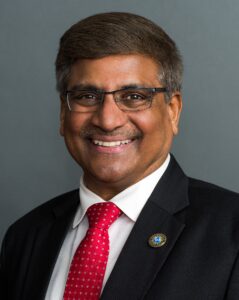

AFTER RECEIVING MORE THAN $427 MILLION FROM THE NATIONAL SCIENCE FOUNDATION (NSF) over at 10-year period from fiscal year (FY) 2012 through 2021, the University of Hawai‘i (UH) has caught the attention of both the NSF and its Director Sethuraman Panchanathan. So much so, that Panchanathan paid a visit to the flagship University of Hawai‘i at Mānoa (UH Mānoa) campus last August to learn more about the world-class, cutting-edge research being conducted by faculty and students throughout the UH System.
In FY 2021, UH was among the top 50 institutions receiving the most funding from NSF, notably ranking higher than Harvard University and Duke University. Panchanathan offered high praise to UH’s research efforts.
“The National Science Foundation essentially is responsible for unleashing great ideas and talent all across our nation, and in the state of Hawai‘i, there is tremendous talent and ideas,” said Panchanathan. “There is also amazing context. If you look at the domain of sustainability, or if you want to understand climate and oceanography, and understanding astronomy, here is a place that is a living laboratory. …The University of Hawai‘i and other institutions in the islands are doing a fantastic job.”
During the whirlwind half-day visit, Panchanathan had a chance chat with faculty and students over lunch and got a closer look at some of UH’s outstanding NSF-funded research programs they represented through special presentations, which included:
Marine Sciences at UH, Center for Microbial Oceanography: Research and Education
David Karl
Professor
School of Ocean and Earth Science and Technology (SOEST), UH Mānoa
Hawai‘i Ocean Time Series
Angelicque White
Professor
SOEST, UH Mānoa
Established Program to Stimulate Competitive Research (EPSCoR)/Change Hawai‘i: Harnessing the Data Revolution for Island Resilience
Gwen Jacobs
Hawai‘i EPSCoR Director
UH Syste
Jason Leigh
Professor/Director
Laboratory for Advanced Visualizations and
Applications, UH Mānoa
NSF CAREER: Soil Pedogenesis, Agroecology, and Their Interactions
Noa Lincoln
Assistant Professor
College of Tropical Agriculture and Human
Resources (CTAHR), UH Mānoa
Ola I Ka Aina: Revolving Ecosystems Utilizing Science, Math and Indigenous Knowledge
Esther Widiasih
Associate Professor
Mathematics, Natural and Health Sciences
UH West ‘Oahu
Hoomalu Halelea: Community led Innovation for Integrated Flood Resilience
Mehana Vaughan
Associate Professor
CTAHR, UH Mānoa
Shortly after Panchanathan’s visit, UH received word that it was selected as part of a $1 million award with seven other western region universities to launch an NSF Innovation Corps Hub that will help to convert research into real-world solutions that have public impact. Then in May 2023, UH was awarded another $1 million under the NSF Engines Development Award: Advancing Climate Resilient Food Innovations (HI, USAPI) to develop a regional innovation engine to facilitate climate resilient food systems in agriculture, fisheries and aquaculture.
“We are grateful that the National Science Foundation awards an average of more than $42 million annually to UH research projects over the past 10 years,” said Vassilis L. Syrmos, UH vice president for research and innovation. “This is validation to the high quality of research being conducted throughout the UH System and true testament to outstanding efforts of our world-class faculty, students and staff.”
